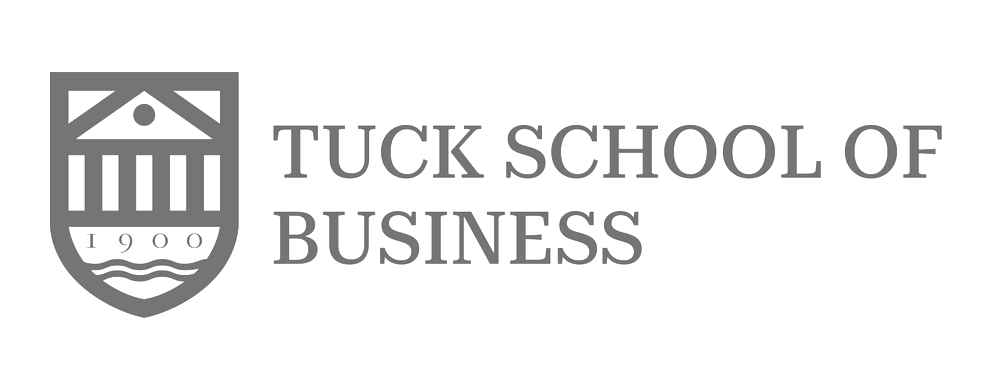Tuck MBA Application Guide
Explore our insights on what the Tuck MBA program
has to offer, along with the latest facts and stats.

About Tuck School of Business
Established in 1900, The Tuck School of Business at Dartmouth College consistently ranks among the top business schools in the world. It is known for its rigorous academic curriculum, exceptional faculty and distinctive approach to leadership development. Tuck’s location in Hanover, New Hampshire, offers a serene and picturesque setting while being a short drive from major business hubs. This balance allows students to focus on their studies while enjoying access to global business opportunities.
One of Tuck’s defining characteristics is its close-knit, collaborative community. With a smaller class size than many other top MBA programs, Tuck fosters deep connections among students, faculty, and alumni. The small class size allows for personalized attention and a tailored curriculum. Professors know students by name, and the academic experience is highly interactive. “Tuckies” are known for their support and camaraderie, creating a lifelong network.
Tuck’s mission is to develop wise, decisive leaders who better the world through business. Tuck faculty members continue to contribute groundbreaking research in various fields of business. Their expertise in areas like entrepreneurship, healthcare, and finance not only enriches the academic experience but also influences industry practices and policies. Tuck also has a strong commitment to entrepreneurship and has an entrepreneurship and innovation center. Recent developments include increased funding and resources for start-up ventures, as well as partnerships with local and global organizations to foster innovation and entrepreneurship.
The school places a strong emphasis on global experiences, and recently they have expanded the TuckGO program, offering students more opportunities for international exposure. This includes partnerships with leading business schools worldwide and innovative virtual global courses that allow students to gain a global perspective without leaving campus.
Tuck places a unique emphasis on leadership development. The “Tuck Leadership Model” is at the core of the program, helping students develop the leadership skills needed to excel in a dynamic and rapidly changing business world.
Change is not just a slogan at Stern. Curriculum innovations in recent years affirm that the school is innovative and forward-looking, For example, Stern launched its Tech MBA to meet evolving business trends and students’ needs and interests. Soon after that, Stern added the Change: Studio to its MBA. This cocurricular program helps students become adept at understanding, impacting and driving change.
Stern also values being “radically responsible.” The school states, “The unequivocal belief in the power of business to improve society is built directly into our culture and curriculum-rich learning opportunities as well as post-MBA jobs.”
With its urban campus in the heart of New York City’s Greenwich Village, Stern offers proximity to Wall Street. It’s also at the epicenter of enterprise in nearby Silicon Alley, home to the second-highest concentration of tech startups in the US. Stern also has strong ties with the fashion industry, luxury brands, entertainment, and media. Immersed in this dynamic environment, the NYU Stern MBA is built around experiential learning opportunities in these industries.
Established in 1900, Stern is well into its second century but proudly stakes its claim to “excellence, unbound by tradition” as a core value. The school states, “People choose us because we are bold, nimble, fearless, hip, edgy, and innovative—a school rooted in rigor, yet on the cutting edge. “
What do these aspects of the Stern culture mean for your chances of admission? In this article, we go beyond the basic facts and school data to share tactical admissions strategies and advice from our 10+ years of coaching MBA candidates to admissions success. Read on for tips from Fortuna’s MBA insiders. Our tips will help you align your NYU Stern application with the school’s specific culture and focus.
Strengths and Specializations
General management, leadership development, entrepreneurship, finance, healthcare, marketing, strategy, sustainability, technology
Graduating Class of 2026
Number of Applicants: 2009 (in 2023)
MBA Class Size: 296
Avg. Work Experience: 5.75 years
Avg. GPA: 3.6
Avg. GMAT: 727
International Students: 30%
Female Students: 44%
Tuition: $80,620/year
Post-MBA Careers (class of 2023)
Career Sector: Consulting 46%; Finance 23%; Technology 14%; ; Healthcare/Pharma/Biotech 6%; Starting Own Business 3%
Top Recruiters: BCG, McKinsey & Company, Bain & Company, Amazon, Deloitte, Barclays, Bank of America, EY-Parthenon, Danaher, Google, Morgan Stanley, JP Morgan, Goldman Sachs
Avg. Base Salary: $175,000; Salary Increase: 133% (Source: FT Rankings 2024)
Employment offered within 3 months of graduation: 96%
Class of 2026 Profile
Number of applicants: 4,550
MBA class size: 352
Average age: 28
Average work experience: 5.2 years
Average GPA: 3.64
Average GMAT: 733
Admissions rate: 31%
Average GRE: V: 164 / Q: 164
International students: 40%
Female students: 47%
Tuition: $86,916/year
Tuck Rankings

Admissions
Deadlines for 2025-2026: R1: Sep 25, 2025, R2: Jan 05, 2026; R3: Mar 25, 2026
Essays
Essay 1: Why are you pursuing an MBA and why now? How will the distinct Tuck MBA contribute to achieving your career goals and aspirations? What particular aspects of Tuck will be instrumental in your growth?
Essay 2: Tell us who you are. How have your values and experiences shaped your identity and character? How will your unique background contribute to Tuck and/or enhance the experience of your classmates?
Essay 3: Describe a time when you meaningfully invested in someone else’s success without immediate benefit to yourself. What motivated you, and what was the impact?
Read our Tips for Writing the Dartmouth Tuck Essays.



